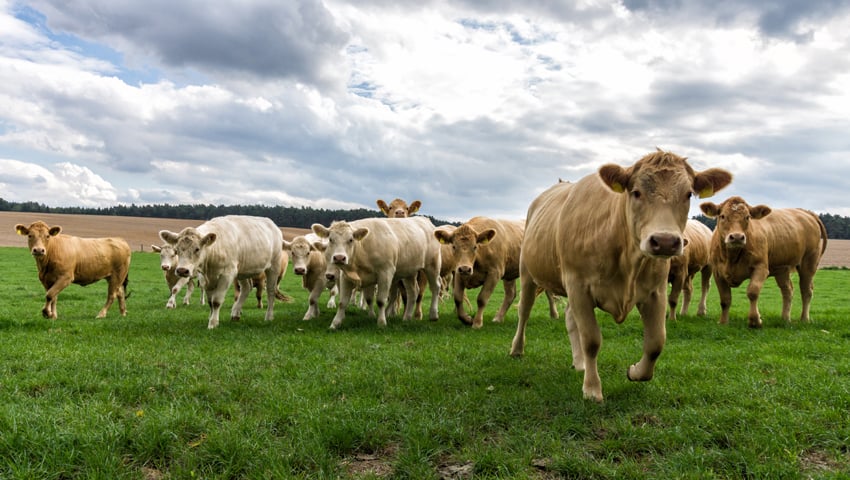FOOD and agriculture are high on the agenda of this COP 28, for the first time. This provides an important historic opportunity to drive progress.
The Sustainable Food Trust (SFT) is in Dubai. They say:
We are working hard to make sure the views of farmers are central and that there is specific progress on the Global Farm Metric and Financing for Sustainable Agriculture, working with our partners in the Global Farm Metric Coalition, Regen10 and Sustainable Markets Initiative.
Food and agriculture are significant to global priorities, not least due to their impact on land use, climate emissions, biodiversity and soil depletion, and central to the livelihoods of many millions of small and family farmers. Scientists predict increasing volatility in crop yields globally, as global heating and extreme weather events take their toll, while rising temperatures could make farming unviable in many developing regions, leaving populations profoundly food insecure.
However, farming systems that work with nature have huge potential as a solution to deliver positive outcomes for climate change mitigation and adaptation, as well as restoring and regenerating our depleted natural resources that we rely on for resilient, healthy and sustainable food production.
A strong scientific evidence base already demonstrates how regenerative agriculture can support climate resilience. To achieve a regenerative and just transition and urgent positive outcomes for climate, biodiversity and people, a reorientation of key global systems is required. This needs to be based on robust evidence of outcomes, while unlocking the market, finance and policy mechanisms that underpin the food system.
The SFT is uniquely placed to partner with and support organisations to unlock this transformation. Founded by a farmer with half a century of practical regenerative experience, aligned with expertise across sustainable science and policy, SFT now works with some of the largest organisations internationally to innovate and develop strategies and solutions that accelerate the shift to a regenerative future for food and farming.
At COP 28, the Sustainable Food Trust is calling for five key commitments from governments and non-state actors:
1) Create and utilise harmonised metrics for farming and food production that demonstrate outcomes for biodiversity, carbon and social parameters alongside economics. Using ‘True Cost’ measures, actors can understand and value the hidden costs and risks and reveal positive and restorative benefits that provide a foundation for decision-making for policymakers and financial institutions. Solutions include adoption of the ‘Regen 10’ regenerative agriculture framework, which is founded on the principles and framework of the Global Farm Metric, which has been co-created by multistakeholder groups across food and farming industries and is currently being piloted on three continents.
2) Finance the transition. By harnessing flows of finance and new financial mechanisms that link to positive regenerative outcomes, financial institutions can accelerate the transition while recognising and reducing their exposure to risks and climate impacts posed by extractive farming practices. For example, the Sustainable Markets Initiative agribusiness taskforce is exploring how to use the might of major businesses, banks, insurers and other institutions to innovate new ways of unlocking finance to support farmer-led transition. We are backing pilots in key countries bringing together farmers, investors, banks, insurers, food companies and retailers.
3) Bring food and farming into national and international policy mechanisms that are driving positive climate action. Including agriculture and food in Nationally Determined Contributions (NDCs) provides a key signal for action across government and the private sector. This must be underpinned by policies that support regenerative transformation and end subsidies for practices that are harmful to climate and the environment. Policy should signal the importance of ending reliance on fossil fuels in agricultural supply chains.
4) At COP 28, two major declarations will confirm the importance of food and agriculture in climate action. The Sustainable Food Trust calls on governments to join the 100+ country signatories who support the Emirates Declaration on Sustainable Agriculture, Resilient Food Systems and Climate Action. The declaration stresses that that any path to fully achieving the long-term goals of the Paris Agreement must include agriculture and food systems and affirms that agriculture and food systems must urgently adapt and transform in order to respond to the imperatives of climate change, including scaling-up adaptation and resilience activities and responses through financial and technical support for solutions, capacity building, infrastructure, and innovations …that promote sustainable food security, production and nutrition, while conserving, protecting and restoring nature.
5) Non-State Actors are urged to join the High-Level Champions Network Call to Action in which they commit to align the global food system with the Paris Agreement on Climate Change, the Kunming-Montreal Global Biodiversity Framework, the 2030 Sustainable Development Agenda, the Sharm El Sheikh Adaptation Agenda, and the Breakthrough Agenda. It calls for time-bound, aligned, holistic, global targets for food systems by COP29 at the latest, and actionable, evidence-based, locally appropriate food systems transition pathways. It emphasises action to support a transition to and scaling up of sustainable approaches to food production that deliver positive outcomes for people, nature, and climate (including agroecology, organic, regenerative and nature-positive approaches and sustainable aquaculture) and climate resilient management of capture fisheries, pursuing co-benefits with animal welfare, air quality and public health, in line with the 1.5-degree climate target.
